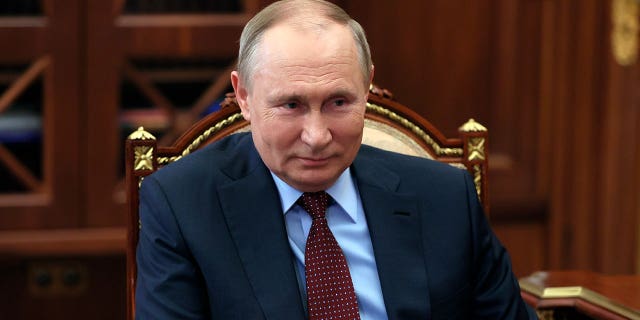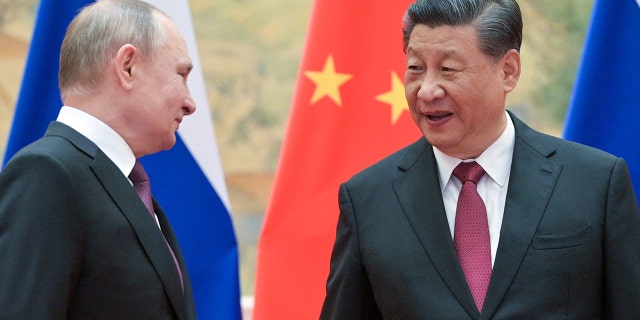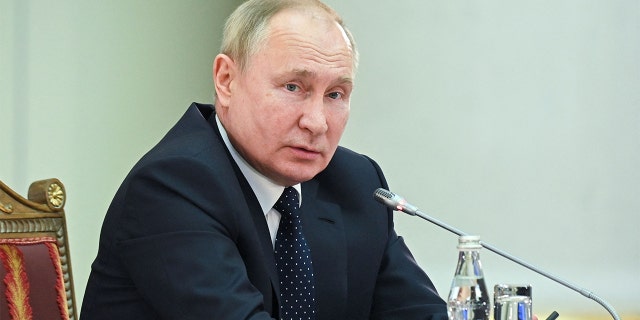
After Ukraine invasion, U.S. should walk away from nuclear talks with Iran
Joe Lieberman: We can’t stand by and do nothing as Russia takes over Ukraine
Former Connecticut Sen. Joe Lieberman on Russia’s invasion into Ukraine.
Russia’s cruel invasion of Ukraine has upended the global order. President Vladimir Putin’s war crimes make him an international pariah alongside the world’s worst autocrats like Syria’s Bashar al-Assad and North Korea’s Kim Jong-un.
This dramatic change in our understanding of Putin means some U.S. policies must also change, specifically in Vienna as world powers try to revive the failed Iran nuclear deal. The U.S. and its European allies must walk away from the talks now before a new agreement revives and strengthens Putin’s ally Ayatollah Ali Khamenei, the supreme leader of the Islamic Republic of Iran.
Russian President Vladimir Putin listens to the head of the Russian Union of Industrialists and Entrepreneurs Alexander Shokhin during their meeting in Moscow, Russia
(Mikhail Klimentyev, Sputnik, Kremlin Pool Photo via AP)
In his State of the Union address on Tuesday, President Biden rightly proclaimed “throughout our history, we’ve learned this lesson: When dictators do not pay a price for their aggression, they cause more chaos; they keep moving.” Any new nuclear agreement recommended to the U.S. by, among others, Russia is inherently untrustworthy. The illogic—some might say foolhardiness—of relying on Putin’s Russia in the talks in Vienna after that same country and tyrant have invaded Ukraine without cause is striking.
In Beijing a month ago, Putin and Chinese President Xi Jinping formalized an alliance in a remarkable meeting and jarring joint communique. They made it clear that the purpose of their partnership is to dislodge the U.S. from its leadership of the international order that created security and prosperity around the world for 75 years. Putin and Xi also redefined “democracy” to their benefit and freedom’s detriment. It is no longer a system like ours, they say, that is characterized by the rule of law, human rights, opportunity, and governments that govern with the consent of the governed. Rather, the Russian and Chinese definition of democracy is simply a government that works, regardless of whether its citizens have any freedom or economic opportunity. This is a direct global challenge to our founding values and form of government, which even though currently divided by partisanship, is infinitely preferable to their autocratic, kleptocratic, repressive regimes.
BEIJING, CHINA – FEBRUARY 4, 2022: Russia’s President Vladimir Putin (L) and his Chinese counterpart Xi Jinping pose during a meeting at the Diaoyutai State Guesthouse. Alexei Druzhinin/Russian Presidential Press and Information Office/TASS (Photo by Alexei DruzhininTASS via Getty Images)
(Photo by Alexei DruzhininTASS via Getty Images)
To start the nuclear talks in Vienna, the U.S. accepted a demeaning demand from Iran that its representatives would not sit in the same room with representatives of the U.S. government. While the Europeans serve as intermediaries to bring the latest Iranian proposals to the American delegation, Russia and China are playing leading roles in bridging gaps as U.S. delegates wait at another hotel. But the Russians and Chinese do not wish us well—having recently declared ideological and geopolitical war on us—and that is one of the reasons the U.S. will not do well in any agreement that emerges from Vienna.
Beyond the recent Putin-Xi union and the current war Russia started in Ukraine, our relations with Russia and China have become increasingly hostile: with Russia over its anti-American involvement in many places around the world, and its willingness to imprison or kill its political opponents. China’s repression of the Uyghurs and Hong Kongers, its unfair international economic activities, and its threats to democratic Taiwan have put it in conflict with the U.S.
It is not surprising, therefore, that Russia and China have both become partners of the anti-American government in Tehran. Russia has joined forces with Iran and Syria against the Syrian people bringing about the deaths of more than a half million Syrians and tangibly supports Iran’s military. China circumvents our sanctions laws and illegally buys billions of dollars of oil from Iran annually. Russia and China are thoroughly biased participants in the negotiations in Vienna, not neutral mediators, yet we remain dependent upon them.
How can the American people possibly trust an agreement with Iran that Putin and Xi helped shape to their liking?
How can we put our trust in the leaders of a country like Iran that continues to attack our allies in the United Arab Emirates and Saudi Arabia as well as American military installations in the region, threatens Israel with nuclear obliteration, and enriches uranium and builds missiles in violation of the previous nuclear agreement?
How can we imagine that an agreement that is supposedly in our security interest and that of our allies could possibly emerge from such an unfair negotiation with such an untrustworthy country?
Russian President Vladimir Putin attends an informal annual summit of the Commonwealth of Independent States (CIS) heads of state at the Konstantin Palace presidential residence in Strelna, outside Saint Petersburg, on December 28, 2021. (Photo by Yevgeny BIYATOV / SPUTNIK / AFP) (Photo by YEVGENY BIYATOV/SPUTNIK/AFP via Getty Images)
(Photo by YEVGENY BIYATOV/SPUTNIK/AFP via Getty Images)
We cannot. No deal designed in part by some of the most dangerous nations of the international community including Putin’s Russia with the blood of innocent Ukrainians on his hands can be in the U.S. national interest. Ukraine has reminded us that autocrats and dictators can’t be trusted because they do not respect international law, human rights, or human life.
CLICK HERE TO GET THE OPINION NEWSLETTER
A better course would be for the Biden administration to walk away from the negotiations in Vienna and tighten the economic pressures on Iran’s struggling economy until the Iranian regime is willing to return to direct negotiations with us and our allies, including those most impacted by Iran’s behavior in the region, to resolve the full scope of its malign behavior. Iran’s nuclear enrichment, long-range missile development, and support of terrorism must end. In return, Iran can expect an end to economic sanctions against it and to return to the lawful global economy.
CLICK HERE TO GET THE FOX NEWS APP
That kind of principled, tough, realistic American policy would encourage our allies and shake our enemies, not just in the Middle East but far away in places like Moscow and Beijing.
Mark D. Wallace is the CEO of UANI. He served as U.S. ambassador to the United Nations for management and reform during the administration of President George W. Bush.
Source: Read Full Article




